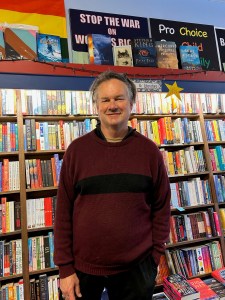
I had a great time talking with Michelle Gutman of UpUp Books in Portland, Oregon, about how to bring people together through books. Gutman opened UpUp in 2023, after starting on a social service path during the pandemic. She was working with children, getting trained to address domestic violence and prevent suicide, and she was moved by connecting with others, but she felt that something wasn’t quite right. A lifelong reader who grew up with poets and artists, Gutman realized that what she always wanted to do was to open a bookstore — and that doing so would scratch her itch to bring people together.
“I realized…it’s not something I’m running but the community’s running, that I can have a bookstore that has a workshop space and functions like an apothecary,” said Gutman. “You come in and you’re not feeling so great, and you’re drawn to what’s going to ease your ailments.”
Gutman had previously lived in Buckman (in NE Portland) and knew right away that that was the neighborhood for her store. From the beginning, she approached UpUp as a place that would be responsive to the changing needs of the neighborhood. She was fully aware that Portland already had a thriving ecosystem of great bookstores and wanted to focus on small presses, local authors, and two-wheeled literary outreach.
“I quickly formed a relationship with Street Books, which is a bicycle-powered library for those living outside. They’re one block down,” she said, noting that the proximity meant she could make an immediate positive impact by serving as a conduit for book donations. “Because they’re so close and only open on Tuesday, I thought why don’t people just drop off books for them here. Then I did a fundraiser at my shop for their spring campaign, featuring local poets Matthew Dickman and Marcus Lattimore. Marcus is an ex-football player and an amazing spoken-word poet who takes a typewriter to different places in Portland, asks people to give him a word and writes a poem with it on the spot.”
Gutman knew that she wanted to have a “kickass” poetry section, but the business reality soon became apparent. As she started buying books for the shop, she discovered poetry volumes are expensive, and because they tend to be physically small, they are easy for the casual shopper to miss. After talking to a friend about the layout of the shop, she decided to put poetry on the new arrivals shelves that prop books up to showcase the full cover. When you walk into UpUp, beautiful poetry collections are the first thing you see.
I asked Gutman what she has found surprising in terms of sales, and I was pleased to learn that she sells a lot of fiction.
“It’s interesting to see what people gravitate towards,” she said, noting that she assumed there would be more interest in nonfiction. “Although there is interest in social justice and climate change, there is not as much as I thought, and people are more interested in local authors and fiction.”

I’m hoping people will pick up a copy of my novel The Good War at an event at UpUp that I’m offering there on March 6th with another Portland writer, Mary Rechner, whose most recent book, Marrying Friends, is out from local small press Propeller Books. I was inspired by UpUp’s eclectic programming to suggest that we discuss books that have had an influence on our work as well as reading from our own books. We will also invite the audience to share their thoughts about books that have made a big impression on them.
UpUp is the sort of cozy and attractive space that makes you want to engage with your fellow readers, writers, and artists. In the workshop space in the back of the store, paintings by Gutman’s father hang on the walls. There you can take a workshop such as “Eno/Ono,” which invites writers to employ some of the strategies musicians use to generate new work or participate in Gutman’s six-week series engaging with Julia Cameron’s The Artists Way. Gutman also offers a semi-monthly book club where she leads the conversation artfully — she comes prepared with great questions but knows how to pass the mike.
Gutman notes that everything in her store is on wheels, which makes it easy to rearrange the space for hosting events and gathering community. Her many upcoming plans for UpUp include hosting a roundtable discussion and fundraiser for local food magazine Kitchen Table on Thursday, March 27th, and a 15-year celebration for Street Books on Thursday, April 10th. She is also working on creating “book boxes,” artfully packaged sets of works that work well together — kind of like an herbalist at an apothecary, putting together the teas and tinctures to lift you up or calm you down. I recommend you check out UpUp when you’re in Portland — it’s a perfect place to browse and find that special something you didn’t know you needed.

Author of The Good War and RELIC, Elizabeth Costello was a finalist for the James Jones First Novel Fellowship and the Pirate’s Alley William Faulkner Award. She has written about dance, film, theater, and poetry for SF Weekly and 7X7. Her poetry has been published in venues including The Buffalo Evening News, Crab Orchard Review, Fourteen Hills, and the Solitary Plover.







































